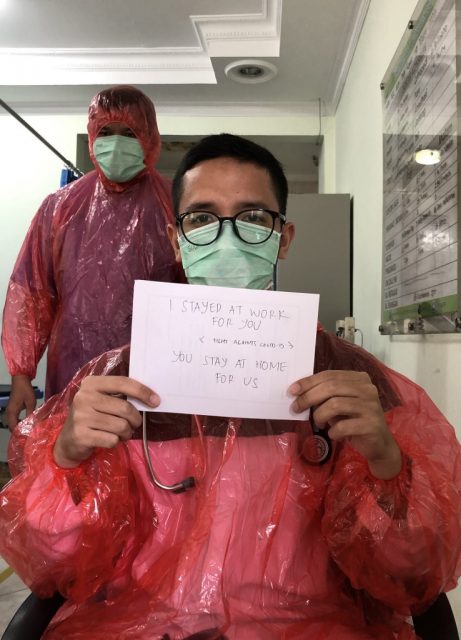
JAKARTA, Indonesia (AFP) — Reduced to sharing goggles and cheap raincoats, Indonesia’s under-equipped doctors are battling a tide of coronavirus infections that is overwhelming its creaky health-care system — and killing their colleagues.
Two dozen doctors have died since the pandemic began in the Southeast Asian nation, and critics warn that the official death toll of 459 is way below reality in a country with some of the lowest virus testing rates in the world.
Hospitals don’t have enough basic protective gear — never mind sophisticated ventilators — leaving many poorly paid doctors to battle the virus with little more than plastic rain ponchos.
Jakarta doctor Muhammad Farras Hadyan said supplies are running so low at his hospital that some colleagues rely on donations from family members to buy the few available certified hazardous material suits.
“The rest rely on the hospital’s supply and they’ve got to wait,” he said.
Handoko Gunawan, a 79-year-old pulmonary specialist, was on the front lines until he was forced into quarantine on suspicion he had contracted the virus.
“I was shaking so bad, and the nurse was trembling,” Gunawan, who later tested negative for the illness, said of treating patients.
“These young health workers have spouses and children at home, but they still brave the challenges.
“Doctors are scarce in Indonesia and if they die we’ll have fewer people to treat patients,” he added.
Indonesia has fewer than four doctors for every 10,000 people, according to World Health Organization data — far below hard-hit Italy (around 40) or South Korea (about 24).
The Indonesian Doctors’ Association has warned that the coronavirus crisis is much worse than reported and the government’s response is “in tatters”.
Latest official figures say Indonesia had some 5,136 confirmed cases, but only 36,000 people have been tested across a sprawling archipelago of more than 260 million — the world’s fourth most populous nation.
The health ministry revealed this week that nearly 140,000 Indonesians are being monitored on suspicion they may have the virus.
“The government’s official data doesn’t reflect the real picture of infections across the country,” said Halik Malik, a spokesman for the doctors’ association.
Jakarta municipal figures show more than 1,000 suspected or confirmed victims buried in local cemeteries under COVID-19 protocols that require bodies to be quickly interned — about five times the government toll in the capital, the epicenter of the outbreak in Indonesia.
Burials in Bandung, a city in West Java that borders the capital region, have doubled to about 400 a month since the outbreak, the province’s governor Ridwan Kamil told AFP.
“It is the same phenomenon as in Jakarta,” Kamil said.
“We can’t confirm these are all COVID-19, but the number of deaths is higher than usual.”
The surge has left doctors like Raditya Nugraha and colleagues at a West Java hospital struggling to keep up, and having to share equipment.
“We don’t have enough goggles so we take turns wearing them,” he said.
© Agence France-Presse







